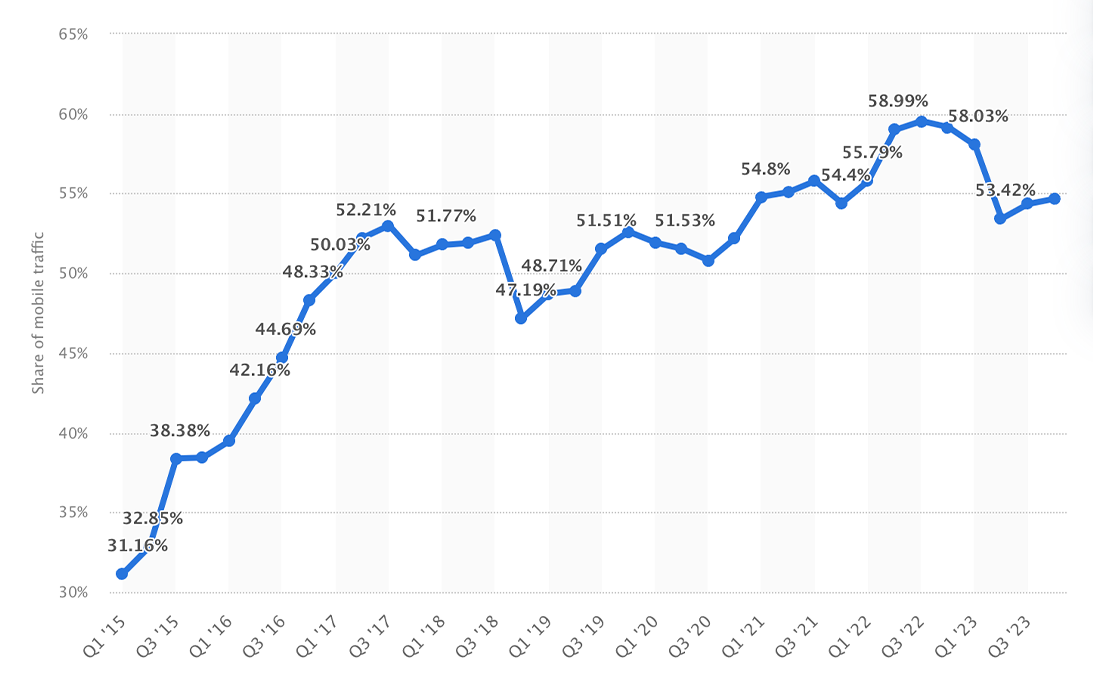5 Steps You Should Take Before Hiring a Web Developer & Common Pitfalls to Avoid
Table of contents
11 Common Pitfalls to Avoid When Hiring a Web Developer
#01
Most people will check out your website before doing business with you
According to Forbes Magazine, around 85% of people will look at your company’s website before purchasing or taking a service.
Your website has limited time to capture a visitor’s interest.

Where will most of your website traffic come from?
#04
A lot of people will look at your website from their mobile phones.

Besides having a great website, it is a numbers game!

#01
Paid Ads
SEO & Content Marketing
Social Media
70% of Americans are on social media – about 239 million people. The chances of your potential buyer being on social media are BIG.
Growing your social media following can significantly increase traffic as you share insights, updates, and promotions that link to your site.
Building a social media following may seem overwhelming for some business owners, and hiring someone to do it can get expensive.
The easiest way to start is to
a) find out what social media platform your potential buyer uses most and
b) focus only on that platform.
Over time, you will learn to use the platform more and more, find ways to improve, and build a following and audience.
#01
What should your website do?
I know this step sounds basic, but it’s important.
Websites serve various purposes, from generating leads to selling products online, or simply acting as a digital portfolio. It’s essential to define what you want your website to achieve.
Doing so will help your web developer determine the various design elements, the sequence they appear on the home page and the menu, and design appropriate call-to-action buttons and prompts.
Ask yourself:
Do you want more calls or appointments? Do you intend to sell products directly through the site? Or do you simply need a website to showcase your work and reassure partners and potential customers that you’re a legit company and your awesome products and services?
Set a budget
Website costs can vary dramatically based on your desired number of pages, necessary features, whether it’s e-commerce or not, the web developer’s expertise, and so on.
Another major factor that determines price is the website company itself. I’ve seen companies send a quote for $15,000 for a website that I’d build for $3,500.
Knowing your budget or the range you’d like to spend helps narrow your options to firms that offer the best value for your money.
Later in this article, I will discuss why the cheapest option is not always the best and how it’s essential to balance cost and quality to ensure the web developer you choose is affordable and professional.
Where will most of your website traffic come from?
#04
Set a timeframe or deadline for your website
A funny story about why setting a deadline with your web developer is important
About two weeks ago, a good friend of mine started a new power-washing business and asked if I could help create his branding and website. Happy to help, we started with his logo design and quickly moved onto the website development. Fast forward to last Monday, before I even had a chance to drink my morning coffee, when I received a frantic text from him. He urgently needed his new website within the next two hours. What?! By now, I was fully awake – without coffee. Why the rush, I wondered? Devan had forgotten to mention a small detail: that day, he was scheduled to speak at a conference in front of several hundred potential commercial clients. Talk about cutting it close! Luckily, we had already completed his website’s content and design, so we put together a great-looking landing page 23 minutes before he went on stage! It showcased his services perfectly and included all the right calls to action. His presentation and the conference were successful, and he walked away with more new customers than he expected. This hilarious yet hectic experience highlights why knowing your deadline and ensuring your web developer can meet it is critical—preferably over a calm cup of coffee!Do some basic market research

#01
Avoid doing it yourself
If you’re not experienced in web development, resist the urge to build your website on your own.
Platforms like WIX might seem convenient, but they are still technical and require some experience and knowledge. Additionally, they often result in limited, cookie-cutter designs that may not adequately serve your unique business needs.
Don’t be afraid to invest in a good website
Consider steering away from a huge marketing agency
Don’t forget to ask for samples of their work

Checking their reviews on Google
Ask what platform your website will be built with
What are the maintenance and ongoing costs?
Ensure you own the website and its content
Purchase your own domain name
Always buy your domain name yourself; using platforms like GoDaddy ensures you retain control over this crucial aspect of your online presence.
SEO should be built into the website from the start
You don’t necessarily have to hire a web developer “near me.”
All I need to build you an excellent website is a computer and internet connection.
Don’t restrict your choices to local web developers.
Many competent web developers and marketing agencies operate remotely, allowing you to hire the best talent from anywhere.
Physical meetings are rarely necessary, as most communications can be handled online.

Bonus Tips:
Apart from considering price and reviewing sample websites, it’s essential that you feel comfortable and confident with your web developer before hiring them.
Don’t overlook any red flags or gut feelings about their professionalism or responsiveness.
Choose a web developer with whom you have a good chemistry right from the initial conversation—someone who is easy to reach and quick to respond knows their business, and does good work.
A solid partnership with a good web developer can significantly enhance your website’s development process and ongoing management.
Trust and communication are key to ensuring that your website continually evolves to meet your business needs effectively.
By being aware of these pitfalls, you can make a more informed decision and select a web developer that will truly meet your needs and contribute to your business’s success.
Choosing the right web developer is a significant decision; getting the right website can impact the success of your online presence.
By being prepared and avoiding common pitfalls, you can find and select a web developer who aligns with your business needs and values.
Remember, a good website is not just about aesthetics; it’s about functionality, adaptability, and alignment with your business goals, and most importantly, it must get you the results you want.
I hope you found this article helpful.
If you’re ready to take the next step in developing a website that truly represents your brand and meets your specific needs, consider contacting us.
We offer personalized web design and marketing services tailored to start-ups and small businesses.
With our thorough and free initial consultation process, we ensure that your digital presence is not only visually appealing but also strategically sound.
Free Homepage Design
Get a stunning, custom homepage for free!
Limited-time offer—claim yours now!





